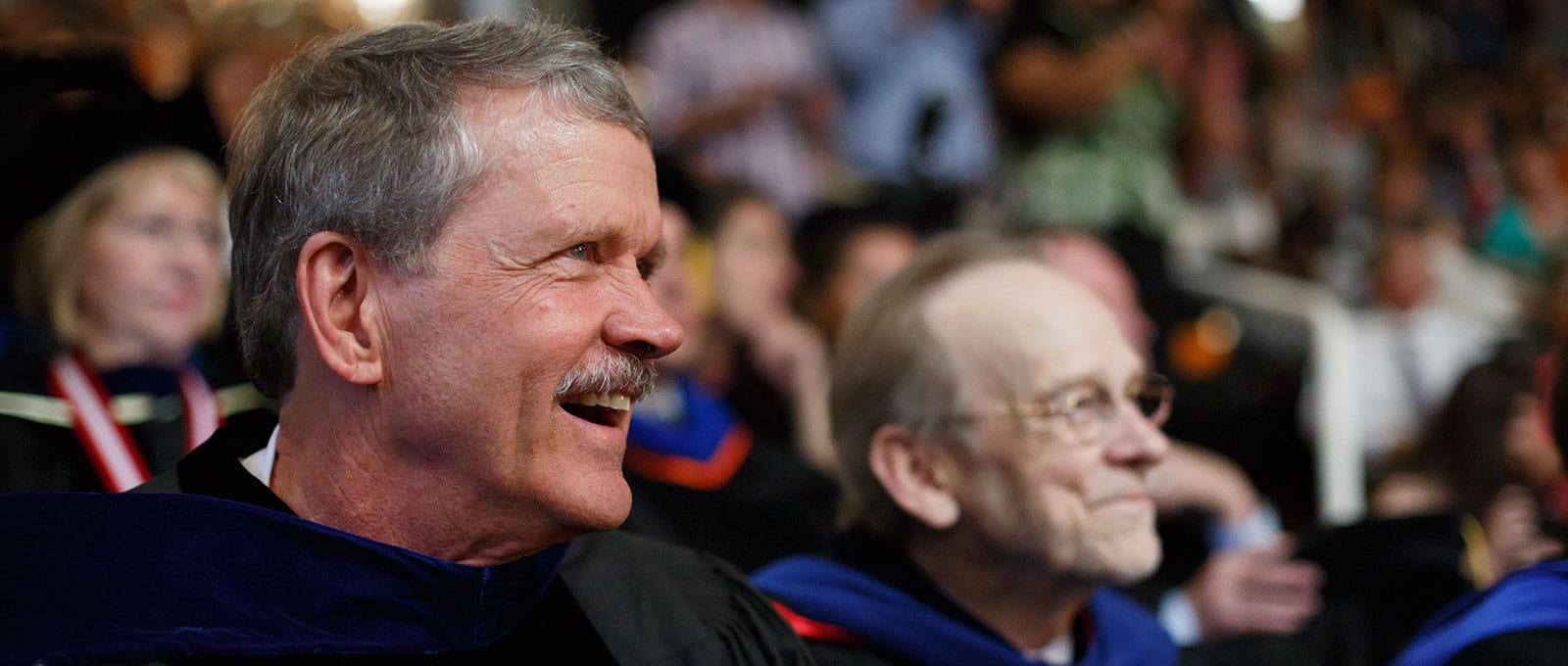
For 41 years, Chuck Maland has exposed UT students to the cultural nuances of film.
“It still seems like a privilege to me to have worked with young adults who are trying to figure out what they want to do in life and what kind of citizens and community members they would like to become.”
Chuck Maland first felt the power of cinema as an art form during the ending of Bonnie and Clyde when Warren Beatty and Faye Dunaway are killed by a sheriff’s posse with machine guns. “It didn’t celebrate the violence,” remembers Maland. “But it left you feeling devastated. After the shooting, there was the rustle of leaves and silence, then a banjo playing in a minor key as the screen went dark.”
Growing up as the second of six children on a Minnesota farm 10 miles from the nearest theater, Maland hadn’t gone to many movies in his early years, but after seeing Bonnie and Clyde and The Graduate as a freshman at Augsburg College in Minneapolis in 1967, he made up for lost time. He took his first film class and wrote film reviews for the school paper. At the University of Michigan, where he got his master’s and PhD in American culture, there were seven student film groups showing movies. “So,” says Maland, “every night for four years, I was in a theater.”

After teaching for two years at Lake Forest (Illinois) College, he came to UT, filling a rare position for teaching film and American literature. “I felt fortunate to have gotten that job since it was exactly the combination I wanted,” says Maland. His wife, Nancy, became a familiar figure to many North Knoxville parents as principal of Sterchi Elementary School and then Halls Elementary School. She eventually became director of elementary education for Knox County Schools.
I do try to make my courses challenging, especially in film, because I want students to push themselves, learn a lot, and appreciate the history and aesthetics of movies.
– Chuck Maland, recipient of the William and Vicki Brakebill College Marshall Award
In 41 years of teaching cinema studies and American literature at UT, Maland has inspired students—and challenged them. Posts on ratemyprofessor.com complain about his tough quizzes on cinema history, especially about Charlie Chaplin, on whom Maland has written two books—Chaplin and American Culture: The Evolution of a Star Image and City Lights, on Chaplin’s 1931 comedy. “I am really passionate about film as an important art form,” he explains. “I do try to make my courses challenging, especially in film, because I want students to push themselves, learn a lot, and appreciate the history and aesthetics of movies.”
After he and his colleagues arranged a minor in cinema studies in the 1980s, he formed the major in 2014. “Watching the first group of eight or 10 cinema studies majors at graduation was a super feeling of happiness for me,” says Maland. “One of them, Ben Murphy, got an American Cinema Editors Fellowship, was an assistant editor on the Lego Batman movie, and is now working for James Cameron in Hollywood on the Avatar sequels.”
Maland has received teaching awards, including the National Alumni Association Teacher Award in 1992 and the Alexander Prize for Excellence in Teaching and Research in 2006. His work also got a boost when he was named the J. Douglas Bruce Professor of English and Cinema Studies in 2010. Maland says the professorship came with a research supplement that enabled him to go to conferences, where he was able to keep up the process of energizing himself and learning new things. “My research necessitated me going to film archives, so the professorship defrayed the expenses for that travel and allowed me to write better books,” he says. “It enabled me to get technology for my classes, including movie DVDs. Getting the recognition was very nice, too. It makes it seem like the work you’re doing has been appreciated.”
In 2018, Maland was named as the College Marshall for the College of Arts and Sciences, which came with the $5,000 William and Vicki Brakebill College Marshall Award, which is given to a selected senior faculty member to fund projects, research, and classroom improvements and to otherwise enhance curriculum.
“I was humbled to learn that I had been named College Marshall,” says Maland, who officially retired at the end of the fall term but will continue to teach one course a year.
“It was a recognition for a career that I’ve enjoyed a lot. Teaching is the reason I went into the profession in the first place, and it still seems like a privilege to me to have worked with young adults who are trying to figure out what they want to do in life and what kind of citizens and community members they would like to become.”
